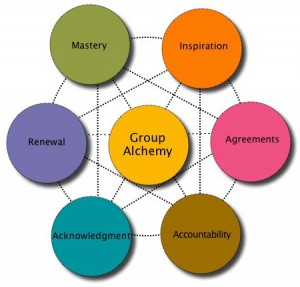When speaking to a group of small business owners last week I was reminded of how much struggle and frustration people experience at work. I began the workshop by asking people to describe their experiences of groups that they work in.
They used words like “no communication, competition, backbiting, lack of leadership, mediocrity, frustration, disappointment” for struggling groups. The costs from this are high – results suffer because people withdraw, not sharing ideas, not getting a sense of accomplishment. And they talked about how they take that stress home; these negative experiences affect our families and our health.
Yet, when I asked about their experiences of successful groups, people use words like “open communication, efficiency, cooperation, camaraderie, momentum, great results, and fulfillment.”
I’m betting you can relate to both of these kinds of experiences. I know I can. Yet, if we know what success looks like, why don’t we achieve that more often? Why so much suffering?
Struggle Doesn’t Mean You’re a Failure. I believe it’s because we aren’t always sure what to do to create success – in all situations – consistently and reliably.
Mostly we’re doing our best with good intentions, but without a road map or the proper tools for making it work. We hope that other “good” people come together with good intentions and that it will all work well. All we have to rely on is what we’ve learned – and whatever others bring from their own experience. Sometimes that is fine. We have that success described above. But more often, it’s not enough.
We’re inevitably going to run up against occasional conflicts between our personal preferences and desires and those of others. That’s life right? It can be difficult enough when we are with people we love. But when we are thrown together with people we barely know in high-stakes situations such as at work, it can be a real ordeal. Especially when differences in backgrounds and styles are substantial.
 My own struggle led me to search for the formula for creating successful work systems. And now that I’ve studied this question for thirty years I’m quite sure that we can create high-quality relationships while producing great results in the world. It’s not just a matter of chance or of particular personalities who happen to be in the group.
My own struggle led me to search for the formula for creating successful work systems. And now that I’ve studied this question for thirty years I’m quite sure that we can create high-quality relationships while producing great results in the world. It’s not just a matter of chance or of particular personalities who happen to be in the group.
It’s a matter of context – the culture in the group. That’s where the permission, or acceptance, or tolerance of behavior comes from. That’s where the agreements, standards and expectations for how people will act and treat others come from. The quiet suffering that so many people go through at work is a symptom of the lack of open communication and intentionality in creating the group and its culture – together.
The key is to learn about what works to bridge the gap between differences in backgrounds, perspectives and personal styles.
- Try new approaches to holding meetings, solving problems, making decisions, and talking about what really matters. Engage with each other more intentionally – take a bit of time to create the habits that keep communication open – even when it’s touchy.
- Take some time to create routine ways to keep inspiring each other with what you want to create in the world.
- Establish routines for assessing what is working and what is not so that you all get to recreate how best to achieve the goals that you all have committed to.
Keep learning and exploring. Whatever approach you choose to help you to create more intentional relationships in your work, you can rest assured that your efforts will be rewarded.
There is untapped wisdom and talent in every group. I know this because it is a fact that the power of group is emergent. It grows as the communication and accomplishments grow. You can grab a hold of that potential when you set the quality of your group as a priority. You will be able to accomplish more than you had imagined possible, and you will have a great experience doing it.
Cheers to enjoying more camaraderie, momentum, great results, and fulfillment.
